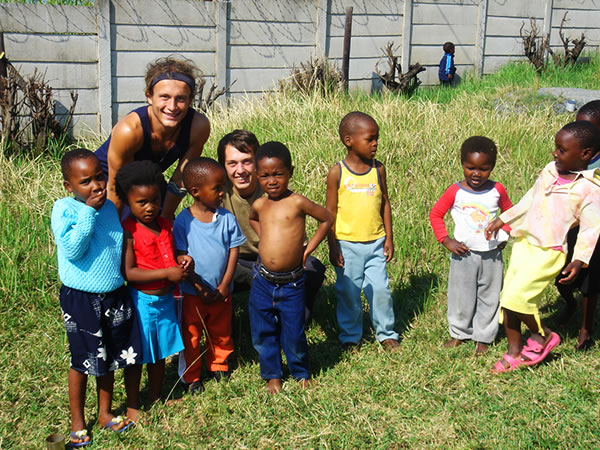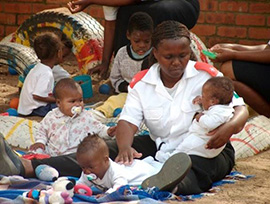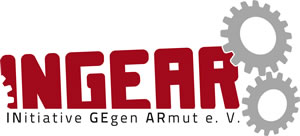
"We nurses are warriors, we fight diseases - we are not enough, we need more warriors to join us!"
This is how Sister Mbatha from the Brotherhood of Blessed Gérard project sums up her story as a “fighter”.
Like many others who work in health systems in underprivileged regions of the world, it is fighting a fight that is often like a fight against windmills: too many sick and weak people are faced with insufficiently trained staff, insufficient medical equipment and a lack of financial resources contradict this Desire for effective help. Every day she fights for those who fight themselves: against tuberculosis, HIV / AIDS and much more.
But she is also happy because individual aspects of her work are improving. Their work is getting better and better through training, further education and training. Government agencies, in particular the Ministry of Health in South Africa, are supporting the project's AIDS aid programs much more strongly than before. And there are more and more new “fighters” who put themselves in the service of those in need.
A large, comprehensive aid program quickly developed from a project founded in 1992 to combat the AIDS problem in south-east South Africa. After the German Father Gerhard Lagleder came to South Africa, the focus of his work was quickly on dealing with the AIDS problem in the KwaZulu-Natal region. In 1992 he founded the Brotherhood of Blessed Gérard in Mandini / South Africa. Within 11 years, 14 facilities and programs were created, including a children's home for AIDS orphans, an AIDS hospice, a sewing school, a household school, HIV education programs, and much more , 6 million euros) and is developing more and more programs that meet the needs of the population.
 There is a problem in South Africa that many countries are familiar with: rural regions are disadvantaged in terms of access to medicines, educational programs and job opportunities. The KwaZulu-Natal region is particularly struggling with problems related to HIV / AIDS: In 2004, an AIDS rate of 76% was found for the region among the people tested. The situation has improved somewhat since then, but diseases such as HIV / AIDS and tuberculosis still characterize everyday life in the area. A high disease and mortality rate brings a variety of problems with it - children lose their parents, larger siblings are responsible for the nutrition and upbringing of smaller siblings and neglect schooling. Since 2014, more than 700 sick people have been part of the project's HIV / AIDS program every year, malnutrition still plays a significant role (2018: 1,102 case treatments). A major challenge is to get sufficiently qualified staff for the many people in need of support and treatment.
There is a problem in South Africa that many countries are familiar with: rural regions are disadvantaged in terms of access to medicines, educational programs and job opportunities. The KwaZulu-Natal region is particularly struggling with problems related to HIV / AIDS: In 2004, an AIDS rate of 76% was found for the region among the people tested. The situation has improved somewhat since then, but diseases such as HIV / AIDS and tuberculosis still characterize everyday life in the area. A high disease and mortality rate brings a variety of problems with it - children lose their parents, larger siblings are responsible for the nutrition and upbringing of smaller siblings and neglect schooling. Since 2014, more than 700 sick people have been part of the project's HIV / AIDS program every year, malnutrition still plays a significant role (2018: 1,102 case treatments). A major challenge is to get sufficiently qualified staff for the many people in need of support and treatment.
From a small aid project, an organisation has grown that is comprehensively dedicated to the AIDS problem and the needs of the population in the region around Mandini/KwaZulu-Natal. The Brotherhood of Blessed Gerhard now operates several buildings that house an AIDS hospice, a children's home, a kindergarten, hospital beds and rooms for the treatment of AIDS patients as well as for educational and training programs. Staff also travel to neglected residential areas to help people in their homes who do not have access to medication and transportation.
In 2018, there were 64 children in the children's home and 703 AIDS patients receiving treatment. There were 6926 counseling sessions conducted by social workers, 1308 home visits by the home care team and 3328 home visits by AIDS treatment counselors. Vocational training is provided to numerous trainees in social professions.
The annual increase in expenditure poses a major challenge in terms of financing. At the same time, the dependence on foreign donors should not increase.
Added to this is the burden on the health system, which is already in great demand, as a result of the Covid 19 crisis in summer 2020. Containing such a disease and other diseases is made more difficult by the fact that there are many people with previous illnesses and immunodeficiency.
The work should continue to be carried out by people from the region in order to combat the problems on site directly and effectively and not to endanger social structures from outside. INGEAR primarily supports the project's practice of training, deploying and promoting people from the region in the facilities. South African doctors, nurses, educators, trainers and helpers are employed, who act as multipliers in order to sensitize society to how to deal with AIDS patients.
The aim is to support as many people as possible to experience growing up in a way that is suitable for children, to have access to adequate school and vocational training, and to receive the medication and care they need. As the project continues to rely on long-term support, a project completion is not yet in sight.
INGEAR funds have been used since 2017 to finance the training of nurses and members of other social professions. We hope that this will lead to a sustainable improvement in health care, because it will enable young people to receive vocational training, the more interested people will be able to learn these professions, the project will be able to achieve the set goals in the medical field more easily with more staff, and thus the dependence on medical assistance "from outside" can be reduced.

